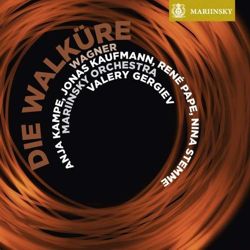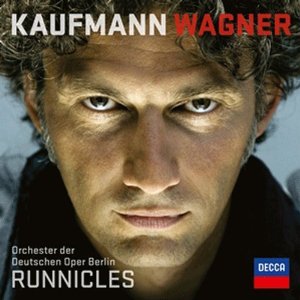|
|
|
|
|
|
|
|
|
The Bay Area Reporter, 02/21/2013 |
| by Tim Pfaff |
|
|
|
Inexhaustible Wagner |
|
|
 Die
Walküre - Mariinsky Die
Walküre - Mariinsky
The last thing I expected from the
Wagner Year now upon us was a new recording of Die Walkuere that would
actually muscle its way into the competition, but right out of the gate,
here it is. The new Valery Gergiev-conducted, (mostly) live Die Walkuere, on
the Mariinsky Theatre's house label, is essential listening no matter how
many other Valkyries ride over your CD shelves (I count 25). At the front of
the best cast that could be assembled today is Nina Stemme, the glory of SF
Opera's recent Ring, as a commanding Bruennhilde. (She's also the Isolde on
Pentatone's much-praised new live recording of Tristan .) Even better, it's
not a one-off. Over the next year the label will release the full cycle
(edited from performances that have already taken place), with Stemme as
Bruennhilde throughout.
Recently, Amazon has trotted out that tired
old The Ring Without Words set, making it all the more tempting to call this
the Walkuere with words. It's hardly that the great Wagnerians of the past
couldn't just pulverize you with Wagner's poems, but one of the consistent
amazements of this new Walkuere is the way the cast savors the words. You'd
expect as much from the native Germans – Jonas Kaufmann as Siegmund, and
Anja Kampe as Sieglinde – but the whole cast sings the words so acutely that
you could almost excuse the label's not including a libretto. Rene Pape's
Wotan renders consonants as if they were, in the words of the late Leonie
Rysanek, "wowels," making his second-act monologue particularly transfixing
and chilling.
Alert to both the music's long line and the urgency of
the moment, Gergiev partners as well as leads the performance. Just when he
seems to be passing over a detail of the score you love, he brings a handful
more to the fore in fresh perspective. He merely makes you mindful of how
inexhaustible this score is.
It's strange that he could not turn up
one of those legendary Russian "black basses" for Hunding, but Mikhail
Petrenko is fine, and the other Russian principal, Ekaterina Gubanova, nails
Fricka in a rich characterization that puts her among the greats in one of
the trickiest roles in the Ring. She exudes such authority that you bend to
her judgment before Wotan does.
Stemme's Bruennhilde is an individual
creation from her first Hoyotohos, sliced out of the air with a sculptor's
precision, and keeps growing in stature and sympathy throughout the opera.
Her solid low range anchors her interpretation, but what's more important is
that the singing is so good you stop paying attention to it and follow
Bruennhilde right into the fire.
Kampe's febrile, multifaceted
Sieglinde is the first to put me entirely out of mind of Rysanek, and
Kaufmann's Siegmund leaves no doubt that the character is the Ring's true
hero. The Met's vile Ring, newly out on DVD (DG), which showed everyone but
the indomitable Waltraut Meier to less than their best advantage, made some
wonder whether Siegmund was even the right role for Kaufmann. His
incandescent performance in St. Petersburg, which predates the Met's, quells
any such doubt.
 Kaufmann
- Wagner Kaufmann
- Wagner
Siegmund's outcry to his clan-father, "Waelse, Waelse,"
is one of those Ring moments audiences wait for and tenors dread. In the
Mariinsky performance, Kaufmann's is primal and perfectly proportioned. His
new solo CD, Kaufmann Wagner (Decca), opens with the same scene capped by a
window-rattling "Waelse, Waelse" more than twice as "big" as the live one –
and, at 10 seconds per "Waelse," surely one of the largest in captivity on
disc – which, impressive as it is, may be this extraordinary disc's single
lapse in taste.
If live performances didn't prove that Kaufmann is
exactly this good, you'd be right to question whether this overwhelmingly
beautiful recording were just the product of great engineering. Instead, the
greatest operatic voice of our century has been ideally recorded in
repertoire he was born to sing. As if he didn't already own the role of
Lohengrin, here he offers the original, two-stanza version of "In fernem
Land" (his "Nessun dorma"), which you'll never hear elsewhere, let alone
sung with such ardor. And in the music he hasn't already taken onstage,
supporting him masterfully is the Orchester der Deutschen Oper Berlin under
Donald Runnicles, who has. To hear the magic they work together, try the
repeated notes in the Tannhaeuser "Rome Narration," not one of which is
alike, not one of which doesn't metamorphose while it's being sung, and not
one of which breaks the sustained musical line.
Still, the marvel is
the Tristan -drenched Wesendonck Lieder in a rare outing for tenor. What's
clear is that all the ingredients are in place for the Tristan of our
lifetimes. As we wait, there's the new Met Parsifal with Kaufmann in live HD
telecast on Sat., March 2.
|
|
|
|
|
|
|
|
|
|
|
|
|
|
|
|
|
|
|